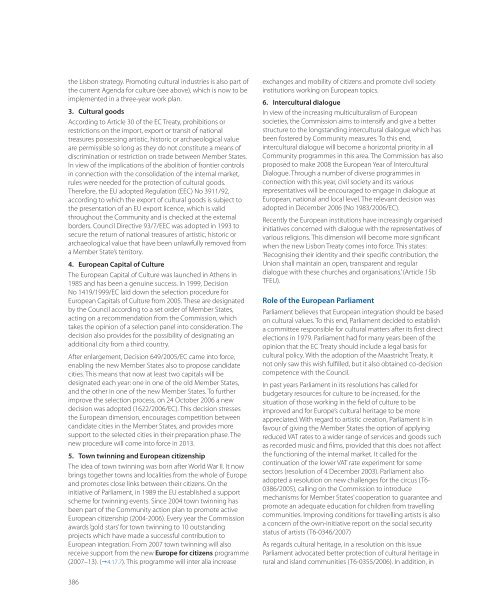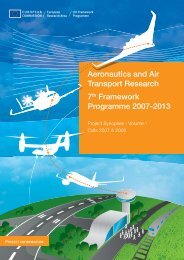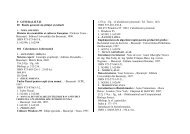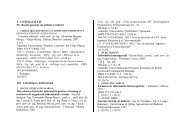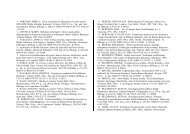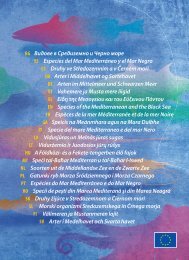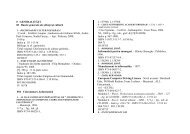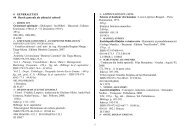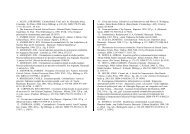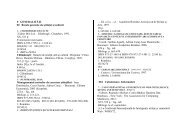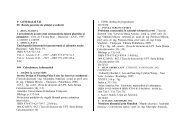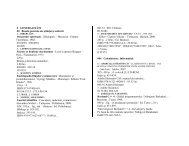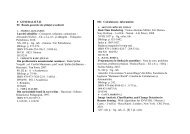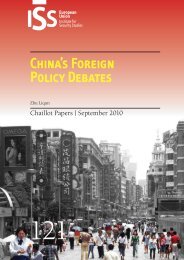Fact Sheets on the European Union â 2 - EU Bookshop - Europa
Fact Sheets on the European Union â 2 - EU Bookshop - Europa
Fact Sheets on the European Union â 2 - EU Bookshop - Europa
You also want an ePaper? Increase the reach of your titles
YUMPU automatically turns print PDFs into web optimized ePapers that Google loves.
<strong>the</strong> Lisb<strong>on</strong> strategy. Promoting cultural industries is also part of<br />
<strong>the</strong> current Agenda for culture (see above), which is now to be<br />
implemented in a three-year work plan.<br />
3. Cultural goods<br />
According to Article 30 of <strong>the</strong> EC Treaty, prohibiti<strong>on</strong>s or<br />
restricti<strong>on</strong>s <strong>on</strong> <strong>the</strong> import, export or transit of nati<strong>on</strong>al<br />
treasures possessing artistic, historic or archaeological value<br />
are permissible so l<strong>on</strong>g as <strong>the</strong>y do not c<strong>on</strong>stitute a means of<br />
discriminati<strong>on</strong> or restricti<strong>on</strong> <strong>on</strong> trade between Member States.<br />
In view of <strong>the</strong> implicati<strong>on</strong>s of <strong>the</strong> aboliti<strong>on</strong> of fr<strong>on</strong>tier c<strong>on</strong>trols<br />
in c<strong>on</strong>necti<strong>on</strong> with <strong>the</strong> c<strong>on</strong>solidati<strong>on</strong> of <strong>the</strong> internal market,<br />
rules were needed for <strong>the</strong> protecti<strong>on</strong> of cultural goods.<br />
Therefore, <strong>the</strong> <strong>EU</strong> adopted Regulati<strong>on</strong> (EEC) No 3911/92,<br />
according to which <strong>the</strong> export of cultural goods is subject to<br />
<strong>the</strong> presentati<strong>on</strong> of an <strong>EU</strong> export licence, which is valid<br />
throughout <strong>the</strong> Community and is checked at <strong>the</strong> external<br />
borders. Council Directive 93/7/EEC was adopted in 1993 to<br />
secure <strong>the</strong> return of nati<strong>on</strong>al treasures of artistic, historic or<br />
archaeological value that have been unlawfully removed from<br />
a Member State’s territory.<br />
4. <strong>European</strong> Capital of Culture<br />
The <strong>European</strong> Capital of Culture was launched in A<strong>the</strong>ns in<br />
1985 and has been a genuine success. In 1999, Decisi<strong>on</strong><br />
No 1419/1999/EC laid down <strong>the</strong> selecti<strong>on</strong> procedure for<br />
<strong>European</strong> Capitals of Culture from 2005. These are designated<br />
by <strong>the</strong> Council according to a set order of Member States,<br />
acting <strong>on</strong> a recommendati<strong>on</strong> from <strong>the</strong> Commissi<strong>on</strong>, which<br />
takes <strong>the</strong> opini<strong>on</strong> of a selecti<strong>on</strong> panel into c<strong>on</strong>siderati<strong>on</strong>. The<br />
decisi<strong>on</strong> also provides for <strong>the</strong> possibility of designating an<br />
additi<strong>on</strong>al city from a third country.<br />
After enlargement, Decisi<strong>on</strong> 649/2005/EC came into force,<br />
enabling <strong>the</strong> new Member States also to propose candidate<br />
cities. This means that now at least two capitals will be<br />
designated each year: <strong>on</strong>e in <strong>on</strong>e of <strong>the</strong> old Member States,<br />
and <strong>the</strong> o<strong>the</strong>r in <strong>on</strong>e of <strong>the</strong> new Member States. To fur<strong>the</strong>r<br />
improve <strong>the</strong> selecti<strong>on</strong> process, <strong>on</strong> 24 October 2006 a new<br />
decisi<strong>on</strong> was adopted (1622/2006/EC). This decisi<strong>on</strong> stresses<br />
<strong>the</strong> <strong>European</strong> dimensi<strong>on</strong>, encourages competiti<strong>on</strong> between<br />
candidate cities in <strong>the</strong> Member States, and provides more<br />
support to <strong>the</strong> selected cities in <strong>the</strong>ir preparati<strong>on</strong> phase. The<br />
new procedure will come into force in 2013.<br />
5. Town twinning and <strong>European</strong> citizenship<br />
The idea of town twinning was born after World War II. It now<br />
brings toge<strong>the</strong>r towns and localities from <strong>the</strong> whole of Europe<br />
and promotes close links between <strong>the</strong>ir citizens. On <strong>the</strong><br />
initiative of Parliament, in 1989 <strong>the</strong> <strong>EU</strong> established a support<br />
scheme for twinning events. Since 2004 town twinning has<br />
been part of <strong>the</strong> Community acti<strong>on</strong> plan to promote active<br />
<strong>European</strong> citizenship (2004-2006). Every year <strong>the</strong> Commissi<strong>on</strong><br />
awards ‘gold stars’ for town twinning to 10 outstanding<br />
projects which have made a successful c<strong>on</strong>tributi<strong>on</strong> to<br />
<strong>European</strong> integrati<strong>on</strong>. From 2007 town twinning will also<br />
receive support from <strong>the</strong> new Europe for citizens programme<br />
(2007–13). (4.17.7). This programme will inter alia increase<br />
exchanges and mobility of citizens and promote civil society<br />
instituti<strong>on</strong>s working <strong>on</strong> <strong>European</strong> topics.<br />
6. Intercultural dialogue<br />
In view of <strong>the</strong> increasing multiculturalism of <strong>European</strong><br />
societies, <strong>the</strong> Commissi<strong>on</strong> aims to intensify and give a better<br />
structure to <strong>the</strong> l<strong>on</strong>gstanding intercultural dialogue which has<br />
been fostered by Community measures. To this end,<br />
intercultural dialogue will become a horiz<strong>on</strong>tal priority in all<br />
Community programmes in this area. The Commissi<strong>on</strong> has also<br />
proposed to make 2008 <strong>the</strong> <strong>European</strong> Year of Intercultural<br />
Dialogue. Through a number of diverse programmes in<br />
c<strong>on</strong>necti<strong>on</strong> with this year, civil society and its various<br />
representatives will be encouraged to engage in dialogue at<br />
<strong>European</strong>, nati<strong>on</strong>al and local level. The relevant decisi<strong>on</strong> was<br />
adopted in December 2006 (No 1983/2006/EC).<br />
Recently <strong>the</strong> <strong>European</strong> instituti<strong>on</strong>s have increasingly organised<br />
initiatives c<strong>on</strong>cerned with dialogue with <strong>the</strong> representatives of<br />
various religi<strong>on</strong>s. This dimensi<strong>on</strong> will become more significant<br />
when <strong>the</strong> new Lisb<strong>on</strong> Treaty comes into force. This states:<br />
‘Recognising <strong>the</strong>ir identity and <strong>the</strong>ir specific c<strong>on</strong>tributi<strong>on</strong>, <strong>the</strong><br />
Uni<strong>on</strong> shall maintain an open, transparent and regular<br />
dialogue with <strong>the</strong>se churches and organisati<strong>on</strong>s.’ (Article 15b<br />
TF<strong>EU</strong>).<br />
Role of <strong>the</strong> <strong>European</strong> Parliament<br />
Parliament believes that <strong>European</strong> integrati<strong>on</strong> should be based<br />
<strong>on</strong> cultural values. To this end, Parliament decided to establish<br />
a committee resp<strong>on</strong>sible for cultural matters after its first direct<br />
electi<strong>on</strong>s in 1979. Parliament had for many years been of <strong>the</strong><br />
opini<strong>on</strong> that <strong>the</strong> EC Treaty should include a legal basis for<br />
cultural policy. With <strong>the</strong> adopti<strong>on</strong> of <strong>the</strong> Maastricht Treaty, it<br />
not <strong>on</strong>ly saw this wish fulfilled, but it also obtained co-decisi<strong>on</strong><br />
competence with <strong>the</strong> Council.<br />
In past years Parliament in its resoluti<strong>on</strong>s has called for<br />
budgetary resources for culture to be increased, for <strong>the</strong><br />
situati<strong>on</strong> of those working in <strong>the</strong> field of culture to be<br />
improved and for Europe’s cultural heritage to be more<br />
appreciated. With regard to artistic creati<strong>on</strong>, Parliament is in<br />
favour of giving <strong>the</strong> Member States <strong>the</strong> opti<strong>on</strong> of applying<br />
reduced VAT rates to a wider range of services and goods such<br />
as recorded music and films, provided that this does not affect<br />
<strong>the</strong> functi<strong>on</strong>ing of <strong>the</strong> internal market. It called for <strong>the</strong><br />
c<strong>on</strong>tinuati<strong>on</strong> of <strong>the</strong> lower VAT rate experiment for some<br />
sectors (resoluti<strong>on</strong> of 4 December 2003). Parliament also<br />
adopted a resoluti<strong>on</strong> <strong>on</strong> new challenges for <strong>the</strong> circus (T6-<br />
0386/2005), calling <strong>on</strong> <strong>the</strong> Commissi<strong>on</strong> to introduce<br />
mechanisms for Member States’ cooperati<strong>on</strong> to guarantee and<br />
promote an adequate educati<strong>on</strong> for children from travelling<br />
communities. Improving c<strong>on</strong>diti<strong>on</strong>s for travelling artists is also<br />
a c<strong>on</strong>cern of <strong>the</strong> own-initiative report <strong>on</strong> <strong>the</strong> social security<br />
status of artists (T6-0346/2007)<br />
As regards cultural heritage, in a resoluti<strong>on</strong> <strong>on</strong> this issue<br />
Parliament advocated better protecti<strong>on</strong> of cultural heritage in<br />
rural and island communities (T6-0355/2006). In additi<strong>on</strong>, in<br />
386


